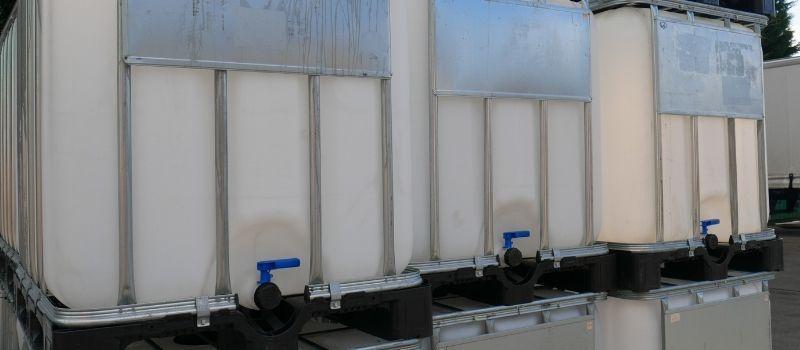What is an IBC?
An intermediate bulk container (IBC) is used to store and transport various liquids. Their large size allows you to store large amounts of liquids at one time, making them popular with construction sites or public events such as festivals.
Why do people use an IBC?
There are several reasons people use an IBC for storing water or other liquids.
1. Cost-effective Shipping materials can be an expensive expenditure for companies. IBCs offer a cost-effective solution to storing and transporting large quantities of liquids. A company can use one large IBC rather than several smaller containers.
2. Versatile IBCs can hold various items if needed. If they are cleaned in between, which will discuss shortly, an IBC can be used for different liquids each time.
3. Easy to handle Despite their large size, IBCs are easy to pick up and move using a forklift or pallet truck.
4. Reusable If you clean out the bottle of the IBC, you can reuse the IBC several times. The better you clean the IBC after each use, the longer it will last you.
5. Durable The material used in the manufacturing of an IBC is designed to be long-lasting and durable. They will be able to stand up against various weather conditions.
Why is it important to clean your IBC?
Cleaning your IBC can be a tedious task, but it is important to make sure you do it regularly. By ensuring you keep up to date with cleaning your IBC, you can extend the lifespan of your IBC, which will save your money over time. If you don’t regularly clean your IBC, it can become a haven for microbiological contamination for bacteria such as Legionella.
If bacteria begin to grow on the inside of your IBC bottle, then the liquid inside will be contaminated and not be usable, especially if it is intended for use as drinking water. To reduce the risk of this, you need to ensure you clean and maintain your IBC.
Emptying your IBC
Before you can begin cleaning your IBC, you will need to empty it. If you just have water in your IBC, you can simply open the valve and allow the water to pour out of the IBC. Obviously, there is going to be a lot of water in there, so empty the tank into a drain, or use other containers so that the water can be repurposed. If you have potentially harmful chemicals in your IBC, you will need to follow some health and safety procedures.
You will need to ensure the liquid doesn’t spill into the environment or any water courses as this could cause potential contamination. When storing or emptying IBCs that will hold chemicals our best advice is to use a spill containment kit.
Things to consider before you clean your IBC
The main thing to consider is whether you are going to do the cleaning yourself or use a professional cleaning service. A professional cleaning service may cost more than cleaning it yourself, but you can be certain it is thoroughly cleaned and won’t contaminate whatever liquid goes into the IBC next.
You also need to make sure you know what was in the IBC before cleaning. If it was your IBC before, then this will be straightforward. This task will be more complicated if the IBC is second hand.
You should not use reconditioned IBCs for drinking water as you cannot guarantee what was in the IBC before being professionally cleaned.
We hope this article has signified why it is important for you to regularly clean your IBC. If you do decide to clean your IBC yourself, then be sure to purchase a powerful jet washer to remove any residue from inside.
If you’d like to find out more about the IBCs we have available, please contact our sales team on 01777 858009 or email sales@kingfisherdirect.co.uk.

